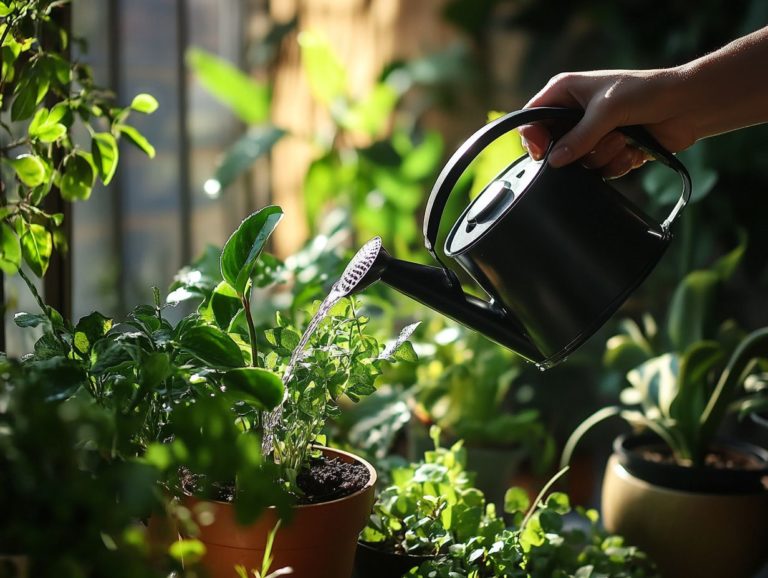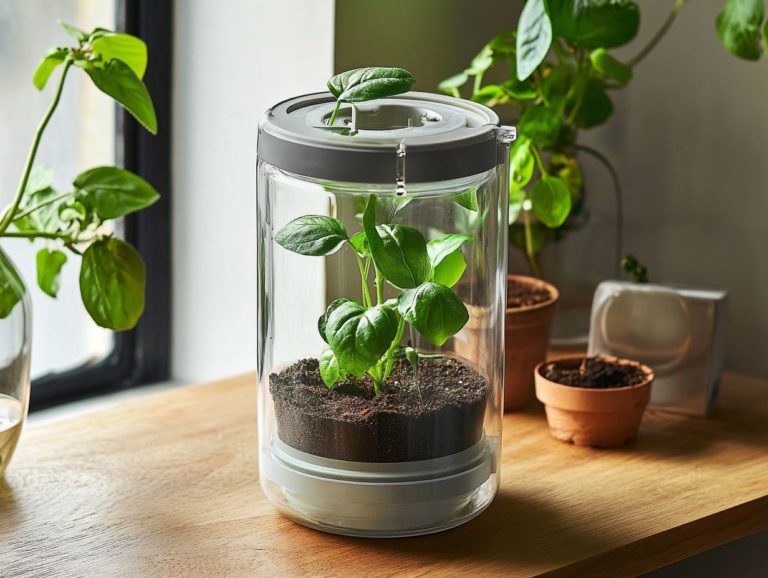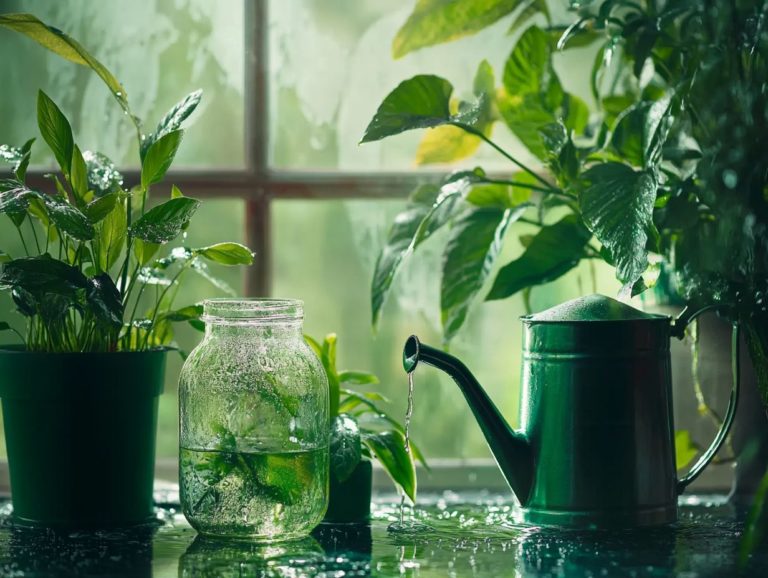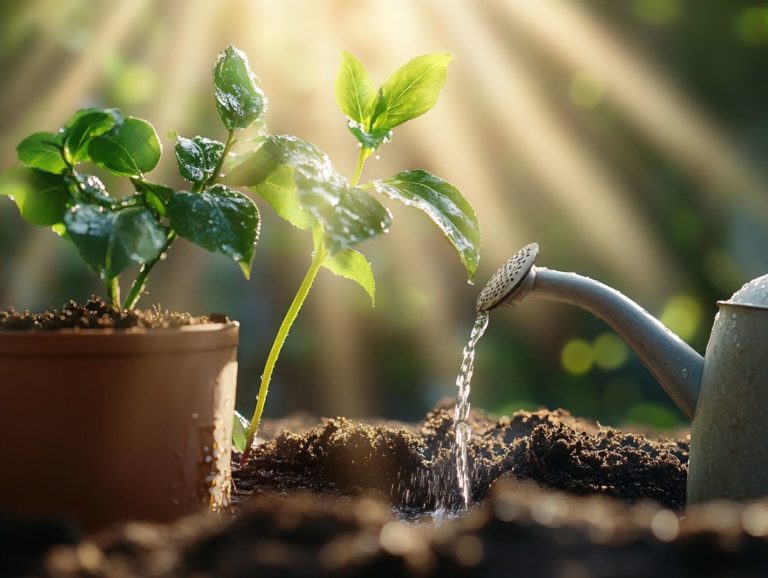The Impact of Water Quality on Plant Health
Water quality is crucial for your plants’ health and growth. It’s often overlooked but essential for their well-being.
Several factors can impact this vital resource. Grasping these elements is essential for any gardener or plant enthusiast. By recognizing the signs of poor water quality and exploring effective improvement methods, you can navigate the intricate relationship between water and plant health.
Discover how to select the right water for your plants and create optimal conditions for them to thrive. Elevate your gardening knowledge and watch your plants flourish with renewed vitality!
Contents
Key Takeaways:

- Poor water quality can significantly impact the growth and health of plants. This can be caused by high levels of chemicals and pollutants, along with imbalanced pH levels.
- Signs of poor water quality in plants include stunted growth, wilting, discoloration, and leaf drop. Identifying and addressing the underlying cause is crucial for improving plant health.
- There are various methods for improving water quality for plants, such as filtration, adding minerals and nutrients, and using natural water sources. Choosing the right type of water for specific plants promotes optimal growth and health.
Understanding Water Quality
Knowing about water quality helps you grow healthier plants and sustain your food systems. Factors like nutrient levels, pathogen contamination, and the pH of the water significantly impact the health of your plants and their ability to thrive.
The efficiency of your irrigation systems and the quality of the water resources you use in gardening are crucial for enhancing crop yield and food security. Understanding water quality’s complexities is essential for achieving peak growth and maximizing agricultural production.
Factors that Affect Water Quality
Several factors significantly influence water quality, impacting both your plants’ health and agricultural productivity. These include harmful contaminants like toxic metals and pesticides, fluctuations in nutrient levels, and pathogen infiltration into your irrigation systems.
Water quality can easily be compromised by sources such as industrial discharges, agricultural runoff, and sewage leakage. For example, toxic metals like lead and arsenic can accumulate in your soil and crops, posing serious health risks when ingested.
Nutrient levels, particularly nitrogen and phosphorus from fertilizers, can lead to the process where water becomes overly enriched with nutrients, leading to excessive plant growth and oxygen depletion. This promotes harmful algal blooms that deplete oxygen and threaten aquatic life.
Employing testing methods, including water sampling and laboratory analysis, helps you gauge contamination levels. Understanding these elements is crucial for you as a farmer or gardener, as poor water quality can impair your crop yields and affect soil health. This knowledge underscores the necessity of adopting sustainable practices to ensure safe, productive growing environments.
The Importance of Water Quality for Plants
Water quality is essential for your plants growth, as it directly impacts nutrient availability and their overall well-being. High-quality water not only delivers crucial nutrients but also maintains optimal oxygen levels in the soil, promoting strong root development.
The source of your water, like rainwater, tap water, or recycled wastewater, affects your plants’ health.
How Water Quality Affects Plant Growth and Health

Water quality greatly affects how plants grow and stay healthy. Good water helps plants absorb essential nutrients and flourish. When you provide clean water, plants can take in vital nutrients more effectively, leading to faster growth and better overall health.
This is crucial because nutrient absorption is closely tied to the health of roots, which are the main way plants connect with their environment. If water quality decreases, plants may suffer from nutrient deficiencies or toxicities. This disruption can hinder chlorophyll production, affecting photosynthesis and overall vitality.
Such issues not only weaken plants against diseases but can also significantly lower crop yields. Therefore, maintaining good water quality is essential for sustainable farming practices that aim to protect the environment while maximizing productivity.
By grasping these dynamics, you can make informed choices that promote healthier crops and more resilient ecosystems.
Signs of Poor Water Quality in Plants
Spotting signs of poor water quality can save your plants! Symptoms can appear in various ways, including leaf discoloration, stunted growth, root diseases, and harmful substances that threaten food safety.
Being attentive to these indicators enables you to act before any damage occurs, ensuring your plants thrive in optimal conditions.
Identifying Symptoms and Causes
Recognizing symptoms of poor water quality is the crucial first step toward fixing the issue. You might see yellowing leaves and wilting, which often signal nutrient deficiencies or the presence of harmful pathogens affecting root health.
These problems can arise from various contaminants, such as heavy metals and pesticides, or high salt levels, disrupting nutrient uptake. Pathogens like fungi or bacteria in contaminated water can cause root rot, severely limiting a plant’s ability to absorb essential nutrients.
Understanding the link between water quality and plant health is vital. Discolored leaves and stunted growth often act as early warnings of underlying water issues. Additionally, the role of soil quality in plant health cannot be overlooked. By addressing these symptoms quickly, you can prevent further decline and promote healthier, more resilient plants.
Improving Water Quality for Plants
Improving water quality for your plants is vital for maximizing their growth and health. You can accomplish this by using advanced irrigation techniques, optimizing nutrient delivery, and fostering beneficial microbes. These methods can significantly enhance the quality of water in your gardening or farming efforts.
This thoughtful approach not only supports robust plant development but also nurtures a thriving ecosystem that benefits your entire agricultural endeavor.
Methods for Improving Water Quality
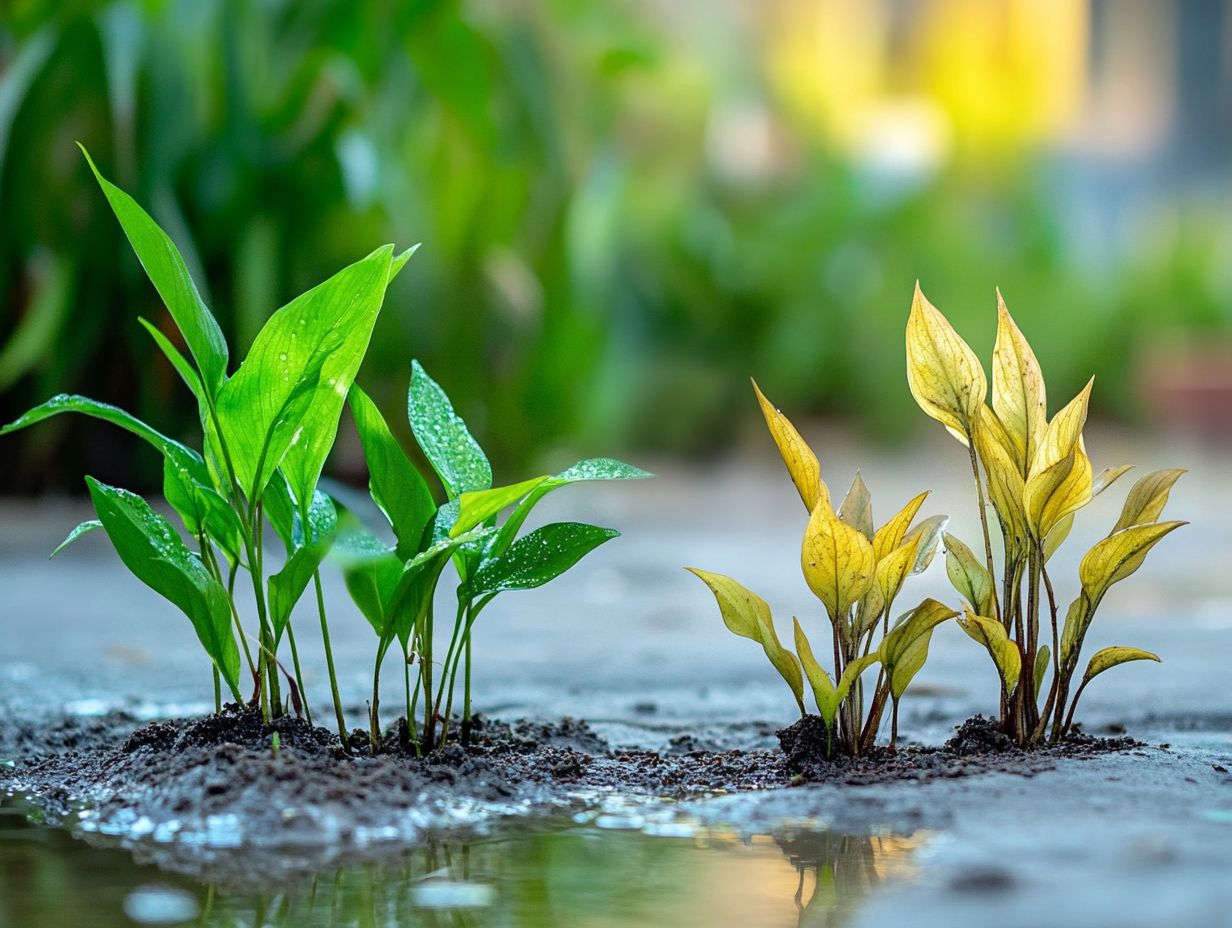
There are many ways to enhance water quality in your garden or farm. These range from advanced filtration processes to optimizing irrigation systems and adding organic materials that improve nutrient delivery.
One effective technique is using water filters, which can help remove harmful contaminants for a safer water supply for your plants. Consider implementing rainwater collection systems. These systems capture rainfall in storage tanks for later use, reducing reliance on municipal water sources.
Integrating organic practices like composting and using natural fertilizers can increase the soil’s ability to hold nutrients while building a vibrant microbial community. With these strategies, you not only benefit your ecosystem but also promote better plant growth and sustainability a true win-win for your garden and the environment.
Choosing the Right Water for Plants
Selecting the right water for your plants is essential for their growth and overall vitality. Different types of water offer distinct benefits and effects.
Rainwater is celebrated for its purity and serves as a refreshing alternative to tap water that may contain minerals and contaminants. Hydroponic systems depend on meticulously calibrated water quality to maximize nutrient absorption and ensure robust plant development.
Choosing the right water can boost your plants’ health and make gardening even more rewarding!
Different Types of Water and Their Effects on Plants
Various types of water can profoundly influence plant health and growth. Factors like mineral content and contamination play critical roles. Rainwater, often rich in nutrients, is generally regarded as the superior choice, while tap water may introduce unwanted minerals that can impede nutrient absorption.
The pH, a measure of acidity or alkalinity, levels of these water types can significantly affect how your plants take in essential nutrients. Rainwater typically has a neutral to slightly acidic pH, making it an excellent option for various plant species.
In contrast, tap water can fluctuate widely in pH, often leaning towards alkalinity, which can hinder nutrient availability. Hydroponic solutions are meticulously crafted to provide a balanced blend of nutrients and pH adjustments, ensuring optimal absorption.
By grasping these variations, you can make more informed decisions about the types of water you use. This ultimately fosters healthier and more vigorous plant growth and improves your water management practices.
Your Top Questions About Water Quality Answered!
1. What is the impact of water quality on plant health?
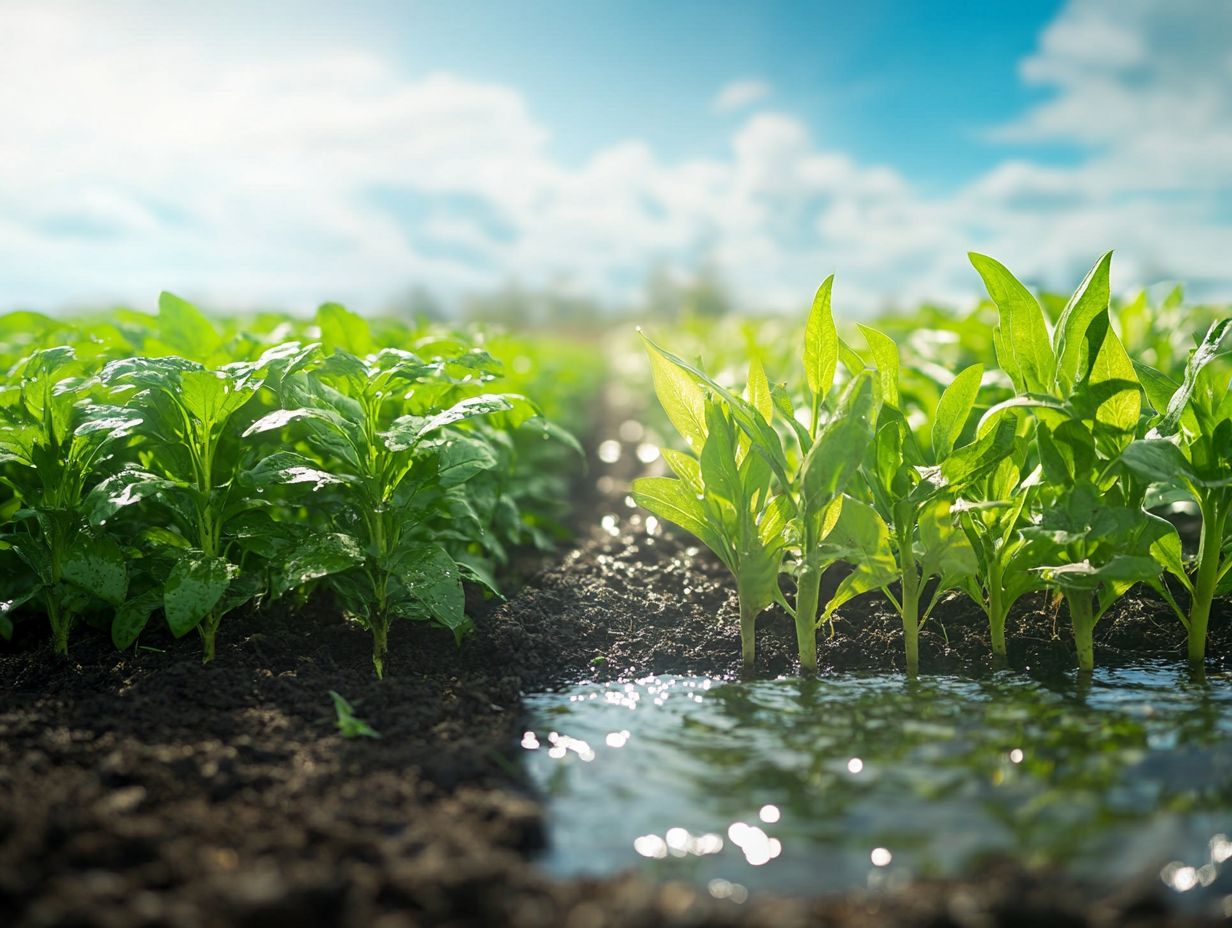
The quality of water has a significant impact on the health and growth of plants. Water that is contaminated or contains high levels of minerals can hinder the absorption of nutrients, leading to stunted growth and even plant death.
2. How does pH level affect plant health?
The pH level of water can greatly influence plant health. Most plants prefer a slightly acidic pH level of around 6.5-7 for optimal growth. If the water is too acidic or alkaline, it can affect the plant’s ability to absorb nutrients and result in nutrient deficiencies, impacting overall plant health.
3. Can hard water harm plants?
Absolutely! Hard water can be detrimental to plants due to its high mineral content. These minerals can accumulate in the soil and cause nutrient imbalances, leading to poor plant growth and development, which can also affect food security.
4. How does water temperature affect plant health?
The temperature of water can impact plant health in various ways. Cold water can shock plants, while warm water can promote the growth of harmful bacteria and fungi, including pathogens. It’s best to use room-temperature water for watering plants.
5. What are the signs of poor water quality affecting plants?
Signs of poor water quality affecting plants include wilting, stunted growth, yellowing or browning of leaves, and overall poor plant health. Make it a habit to check your water quality regularly; your plants will thank you!
6. How can I improve water quality for my plants?
There are a few ways to improve water quality for plants, such as using a filtration system, collecting rainwater, or letting tap water sit for 24 hours before using it. This allows harmful chemicals like chlorine to dissipate. You can also use distilled water or invest in a water testing kit to ensure your plants receive the best water possible for healthy growth.
Start using the right water today and watch your plants thrive!

